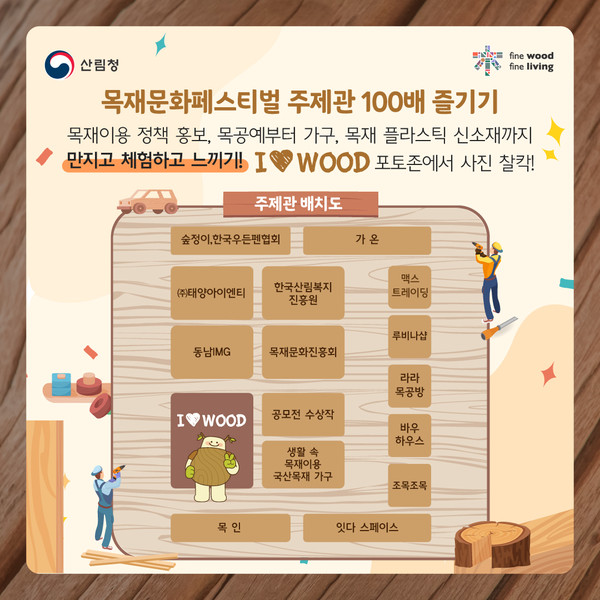Stresses KFS that holds the 2021 Wood Culture Festival non-face-to-face on Oct. 23
The Korea Forest Service (KFS), led by Minister Choi Byeong-am, will host the main event of the “2021 Wood Culture Festival” on the theme of “Wood use--carbon neutrality,” including a wood sound story show, a musical wood wedding, and an online live sale of Korean wood. The event will be operated non-face-to-face on Oct. 23.

According to KFA public relations officials (Ha Kyung-soo and Lee Il-sup), the Talk Show will be open at 11 a.m. on Oct. 23.
It is designed to resolve misunderstandings and prejudices about domestic wood through the story of wood in the life around people, and features the musical Wood Wedding, which meets the special story of 10 couples in their 5th year of marriage through a musical,
The program is scheduled to be broadcast live on the Korea Forest Service YouTube channel (www.youtube.com/user/forestgokr).
The voice story show is hosted by MBC Announcer Kang Da-som, and Comedian Lee Sang-joon and Manager Ha Kyung-soo of the KFS Wood Industry Department. The program is expected to solve the public's curiosity about 'wood use = carbon neutrality' through real-time communication.
The wood wedding ceremony is an event that stems from the Western custom of couples exchanging wooden gifts to commemorate the 5th anniversary of their marriage. The stories of 10 couples selected by screening 107 couples who applied from all over the country will be performed as a musical.
A non-face-to-face event will be held to exchange wooden rings made by the couple and to make children's toys.
In addition, four kinds of domestic wooden household items made by the winners of the KFS Idea Contest for finding alternative wood products to replace plastics will be sold at the lowest price nationwide through the online live commerce channel ‘Grip.’
The Wood Culture Festival is being operated as the I LOVE WOOD themed hall at COEX in Seoul from October 21 to 23, so anyone who adheres to the COVID-19 quarantine guidelines can visit. Visitors can experience various exhibited goods, ranging from household items made of domestic wood to new furniture and wood plastic products and purchase them at a discounted price on the spot.
Director Kim Yong-gwan of KFS Forest Industry Policy Bureau said, “Wood is used in various fields in our daily life as a material for construction and furniture.”
The United Nations Framework Convention on Climate Change (UNFCCC) only recognizes the amount of carbon stored in domestic wood, so it is an important resource for realizing carbon neutrality in 2050.
Kim added, “Through this event, I hope that the fact that many people have seen and learned a variety of wood products, from furniture to new materials that replace plastics, will be put into practice in their daily lives, and the use of domestic wood will spread.”
According to Wikipedia, the Korea Forest Service has the overall responsibility for establishment and implementation of forest policies and laws. The KFS consists of 5 bureaus, 22 divisions, 5 Regional Forest Services, and 27 National Forest Stations. There are KFS-affiliated agencies such as the Forest Aviation Headquarters, the Korea Forest Research Institute, the National Arboretum, and the National Natural Recreation Forest Office. The province and metropolitan cities have their local forestry administrative organizations.

The KFS is actively involved in the United Nations Convention to Combat Desertification, United Nations Framework Convention on Climate Change, and Convention on Biological Diversity to contribute to global environmental issues. Not to mention, initiative actions were taken to implement actual projects based on rehabilitation technologies in collaboration between the government and the private sector. In order to take the leading role in both bilateral and regional cooperation for mitigating desertification and drought, the Korea Forest Service is promoting closer cooperation through bilateral forestry cooperation arrangements and establishment of the Northeast Asia Forest Network.
The KFS hosted UNCCD-COP10 as an opportunity to raise awareness of the Korean people as well as the rest of the world on desertification issues, and contribute to implementing more projects to combat desertification and establishing an effective cooperative mechanism.
The KFS, in close coordination with the Ministry of Foreign Affairs (South Korea), has taken the key role for the establishment of Asian Forest Cooperation Organization (AFoCO).
Korea's forest
The Korean peninsula is located between 33°7′ and 43°1′ in northern latitude, and 124°11′ and 131°53′ in eastern longitude at the heart of the North Western Pacific, sharing a border with China and Russia to the north and lying near the Japanese archipelago to the south. It extends about 960 km southward and its width is about 170 km from east to west, surrounded by three oceans and near 70% of the terrain is mostly mountainous so its terrestrial and marine ecosystems have a variety of species with high biodiversity.
The Korean peninsula encompasses 221,000 km2, 45% of which makes up the Republic of Korea (ROK, South Korea). The 20% of the total land area in the ROK is used for agriculture while forests cover 64%. The Korean peninsula lies in the east of the temperate forest zone, which contributes top the distinct seasonal temperature and precipitation. The main mountain range of the Korean peninsula is the BaekduDaegan Mountains. It stretches 1,400 km from Mt. Baekdu in North Korea all the way down to Mt. Jiri in South Korea, forming the great backbone of the Korean peninsula.
Korea's forest was devastated in the 1950s and 1960s due to the Korean War and land use change for industrialization. Since the establishment in 1967, the Korea Forest Service has made diverse efforts for forest rehabilitation. These efforts returned dramatic increase in the growing stock volume. The volume of merely 10 m3 in the 1960s increased more than 10 times in 40 years recording 103 m3 by the end of 2008. The public benefits of forests grew as well. It is equivalent to an economic value of around US$60 billion, which accounts for 8% of the gross domestic product.
The foundation for successful rehabilitation would be the National Forest Plans established and implemented on 10-year routine. After undergoing four-fold National Forest Plans, the Fifth Plan launched in 2008 which aims to achieve "healthy forest, rich mountains, and happy people" and realize "sustainable green welfare nation". Thus, the Korea Forest Service is making efforts to develop multiple benefits of forest resources and renewable forest industry, provide better quality of life through forestry, and strengthen international cooperation.

